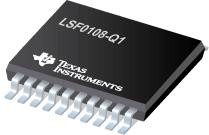● Supports up to 100 MHz up translation and greater than 100 MHz down translation at <= 30 pF cap load and up to 40 MHz up/down translation at 50 pF cap load:
● Allows the LSF family to support more consumer or telecom interfaces (MDIO or SDIO).
● Bidirectional voltage translation without DIR pin:
● Minimizes system effort to develop voltage translation for bidirectional interface (PMBus, I2C, or SMbus).
● 5 V tolerance on IO port and 125°C support:
● With 5 V tolerance and 125°C support, the LSF family is flexible and compliant with TTL levels in industrial and telecom applications.
● Channel specific translation:
● The LSF family is able to set up different voltage translation levels on each channel.
● Qualified for Automotive Applications
● AEC-Q100 Qualified With the Following Results:
● 2000-V Human-Body Model
● 1000-V Charged-Device Model
● Provides Bidirectional Voltage Translation With No
●Direction Pin
● Supports Up To 100 MHz Up Translation and
●Greater Than 100 MHz Down Translation at ≤ 30-
●pF Capacitive Load and Up To 40 MHz Up or
●Down Translation at 50-pF Capacitive Load
● Supports Hot Insertion
● Allow Bidirectional Voltage Level Translation
●Between
● 0.95 V ↔ 1.8 V, 2.5 V, 3.3 V, 5 V
● 1.2 V ↔ 1.8 V, 2.5 V, 3.3 V, 5 V
● 1.8 V ↔ 2.5 V, 3.3 V, 5 V
● 2.5 V ↔ 3.3 V, 5 V
● 3.3 V ↔ 5 V
● Low Standby Current
● 5-V Tolerance I/O Port to Support TTL
● Low ron Provides Less Signal Distortion
● High-Impedance I/O Pins For EN = Low
● Flow-Through Pinout for Easy PCB Trace Routing
● Latch-Up Performance Exceeds 100 mA Per
●JESD 17
● –40°C to +125°C Operating Temperature Range



